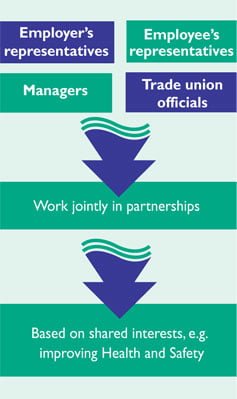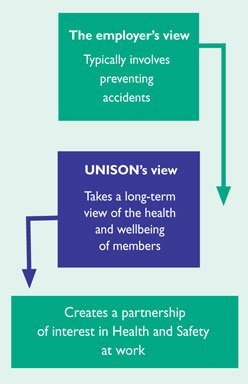Everyone has the right to be in a safe and healthy workplace. This is a basic human right as most people spend a large part of their life at work. Employees in the UK mainly enjoy safe and healthy work conditions – pressure from trade unions over the years has made this possible – but this is not always the case.
Formed in 1993 from the merger of three public sector unions, UNISON is the UK’s largest trade union and has defended workers’ rights and Health and Safety issues. Today, over two thirds of its members are women. Members work in different industries, including healthcare, education, transport, local government, the voluntary sector and call centres. It is crucial for a business’ success that employees and employers act fairly towards each other – if they do not, this can cause difficulties.

UNISON believes most workplace problems can be sorted out with negotiation and agreement. Partnership in the workplace is about employers and employees working together to create a good long-term relationship. Health and Safety partnerships are part of this process. Working with management, many branches of UNISON change people’s working lives for the better. By doing this, they are putting Health and Safety at the centre of the culture of the organisation.
The Health and Safety at Work Act (the law governing this area) is based on the idea of forming partnerships. This principle is supported by government. It has been shown that involving trade union safety representatives in the workforce reduces accidents and deaths by over 50%. Partnership focuses on working towards common interests and shared goals.
The role of unions in the workplace

Unions represent the interests of their members, whether they are nurses, teachers, care assistants or cleaners. A trade union such as UNISON is set into a national structure with local branches, which have locally elected officials.
Typical issues the union involves itself with are:
- Pay discussions. Average earnings are 8% higher in trade union workplaces.
- Bargaining for better holidays. Average trade union members get 29 days annual leave against 23 days for non-unionised workers.
- Gaining compensation for those who are injured or become ill.
- Developing the job of Health and Safety committees.
Typical examples of UNISON’s tasks are:
(a) Caring for cleaning staff – More than 860,000 people work as cleaners in the UK and there is a higher rate of accidents among these employees than anywhere else. They work in schools, hospitals, shops and other businesses. Often little thought has been given to their Health and Safety needs.
On one occasion, UNISON was involved in a case in which cleaners were having to handle materials that were poorly labelled. In some cases, this made them unsafe to use. Discovering their concerns, the UNISON safety representative found the risks involved had not been assessed. UNISON’s actions resulted in an agreement with the employers where only three cleaning chemicals would be used. Training was also given to the cleaners.
(b) Catering with care – Food quality, safety and hygiene are very important, but some employers do not think about the Health and Safety of those preparing and serving the food. Slips and trips in the kitchen are the main causes of accidents. High cooking temperatures, knives and heavy pots are also dangerous.
UNISON branch officials work with local managers to improve the level of care in catering in schools, hospitals and elsewhere. A school catering assistant slipped on an instrument left on the floor when she was setting out tables in a dining area that also served as a classroom. She was badly injured and had to retire. UNISON’s role was to ensure she was compensated and that procedures were put in place to avoid such a thing happening again.
Health & safety legislation

Employers have a responsibility to make workplaces as safe as possible. There are two main legal requirements:
Section 7 (a) of the Act requires all employees to take reasonable care for their own Health and Safety at work and that of others who may be affected by what they do or fail to do. Under HASAWA, an employer must look at what risks exist in the workplace and record the risk assessment. Following this, he/she must:
- appoint employees to apply the Health and Safety measures needed
- set up emergency actions
- provide clear information and training to employees.
Health and Safety at Work Regulations legislation covers standards of care in these areas:
- the upkeep of the workplace, equipment and systems
- indoor ventilation, temperature and lighting
- cleanliness and the handling of waste materials
- room sizes and space
- floors and organisation of corridors
- windows and transparent doors, gates and walls
- ability to clean windows safely
- escalators and moving walkways
- toilets
- drinking water
- cupboards/coat racks for clothing and where people can change clothes
- facilities for resting and eating.
Safe work practice can only take place when the law is kept to. Health and Safety regulations require that employers appoint ‘competent persons’ to help them carry out risk assessments.
While this is the duty of the employer, UNISON carries out training so its representatives have the vital knowledge and skills to work on workplace Health and Safety committees.
UNISON Health and Safety representatives are trained so they have an understanding of:
- the work being assessed
- risk assessment and prevention of risk
- up-to-date Health and Safety measures
- identifying hazards at work.
UNISON and safety representatives

UNISON aims to have at least one safety spokesperson to cover every workplace where it has members. While employers think mainly about preventing accidents, union safety representatives are also concerned about longer-term health and wellbeing.
Union members elect UNISON safety representatives, and the appointment must be given to the employer in writing. Regulations state that a representative needs to be engaged in his or her workplace. They should also have worked with their current (or similar) employer for at least two years. Their tasks are set out in The Safety Representatives and Safety Committee Regulations of 1977.
Functions include inspecting certain workplace areas at least every three months. They can also investigate likely hazards, complaints, the causes of accidents, dangerous incidents and diseases.
UNISON and important work issues

There are a number of important issues that UNISON is involved in:
a) Women’s Health and Safety: research carried out by UNISON shows women face many problems, including:
- Back pain. At least 100,000 women a year suffer with back problems caused at work.
- Physically attacked. One in ten 24 to 34 year old workers have been abused by a member of the public while at work (a third higher than men).
- Disorders linked with heavy lifting and repetitive tasks. These are the most commonly reported work-related illnesses.
UNISON has campaigned on a wide range of women’s Health and Safety issues, resulting in major progress. For example, it was successful in bargaining that women should be able to wear protective shoes in school kitchens. This then reduced the number of slips, trips, falls and injuries.
b) Violence: this includes serious incidents that cause physical injury as well as threats and verbal abuse. Employees who deal with the public are most at risk, especially those who work with people such as drug abusers and the mentally ill.
UNISON gives guidance and training on how to deal with this, talking with employers to make sure a comprehensive policy is in place. This includes a clear definition of violence at work and methods to assess the risk. UNISON also ensures that staff know about the policy and that training is provided in preventing and managing violence.
(c) Bullying: this has extended from the playground to the workplace. Research carried out by trade unions shows that up to a quarter of workers have been bullied in the past five years and about half have witnessed it. UNISON provides guidelines so representatives know how to identify it and the proper actions to take. It also works with employers to create policies so bullying can be recognised and dealt with, including:
- a definition of bullying
- prevention measures
- duties of managers and supervisors
- trade union involvement
- information and training.
Other areas of concern to UNISON include reducing stress related to work issues such as passive smoking and working with HIV and AIDS.
Conclusion

Employers must ensure the Health and Safety of their employees and the wider public who come into contact with their business.
Trade unions like UNISON are set up to look after the interests and welfare of their members, working in partnership with employers to ensure high standards of Health and Safety. UNISON is chiefly concerned with ensuring the long-term health and wellbeing of its members.
Through such partnerships, it can put pressure on employers in many ways. These involve:
- taking a specific interest in women’s health issues
- reducing and preventing bullying
- minimising stress
- protecting members from the dangers of passive smoking and repetitive strain injuries from activities such as cleaning and typing.
Everyone should be able to work in a clean, well-maintained, well-lit and ventilated workplace. By joining a trade union like UNISON, the combined strength of the workforce and the union guarantees that proper conditions at work are developed and maintained.
